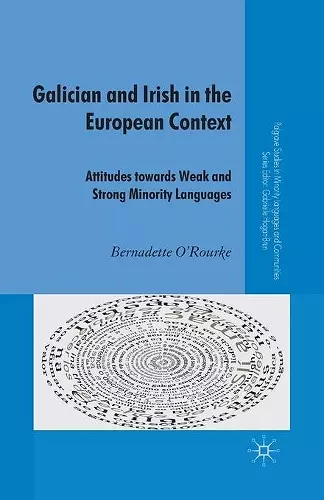Galician and Irish in the European Context
Attitudes Towards Weak and Strong Minority Languages
Format:Paperback
Publisher:Palgrave Macmillan
Published:1st Jan '11
Currently unavailable, and unfortunately no date known when it will be back
This paperback is available in another edition too:
- Hardback£44.99(9780230574038)

This book examines how language attitudes affect the survival of minority languages, focusing on Irish and Galician within their cultural contexts.
In Galician and Irish in the European Context, the author delves into the intricate relationship between language attitudes and ideologies, and their influence on the survival of minority languages. Through a detailed comparative analysis, the book focuses on two specific cases: Irish in the Republic of Ireland and Galician in the Autonomous Community of Galicia, located in north-west Spain. By examining these languages within their respective cultural and political frameworks, the author sheds light on the factors that contribute to the vitality or decline of minority languages in Europe.
The exploration is not merely academic; it reflects real-world implications for communities striving to maintain their linguistic heritage. The author employs a cross-national perspective, allowing readers to understand the broader European context in which these languages exist. By analyzing public attitudes, institutional support, and historical narratives, Galician and Irish in the European Context provides a nuanced view of how language ideologies shape the future of these minority languages.
Ultimately, this book serves as a vital resource for linguists, sociologists, and policymakers interested in the dynamics of language preservation. It offers insights into the challenges and opportunities faced by minority languages, making it an essential read for anyone invested in the future of linguistic diversity in Europe.
This comparative analysis of the Irish and Galican languages is framed by the persepctive that the impact on language maintenance and shift of macro-ocial factors such as political and institutional support can only be assessed adequately through 'the interpreative filter of linguistic eliefs,/attitudes and ideologies' (p. 3/4). The rationale for this and other compartive studies is that they offer 'a broader and more objective framework than can be achieved through single case studies' (p. 4) avoding the solipsism that can be found in the limited horizons of one langauge studies and benefitting from the novel insights that O'Rourke offers.' Dick Vigers, University of Southampton, Current Issues in Language PLanning, Sept. 2012
ISBN: 9781349365111
Dimensions: unknown
Weight: unknown
185 pages
1st ed. 2011